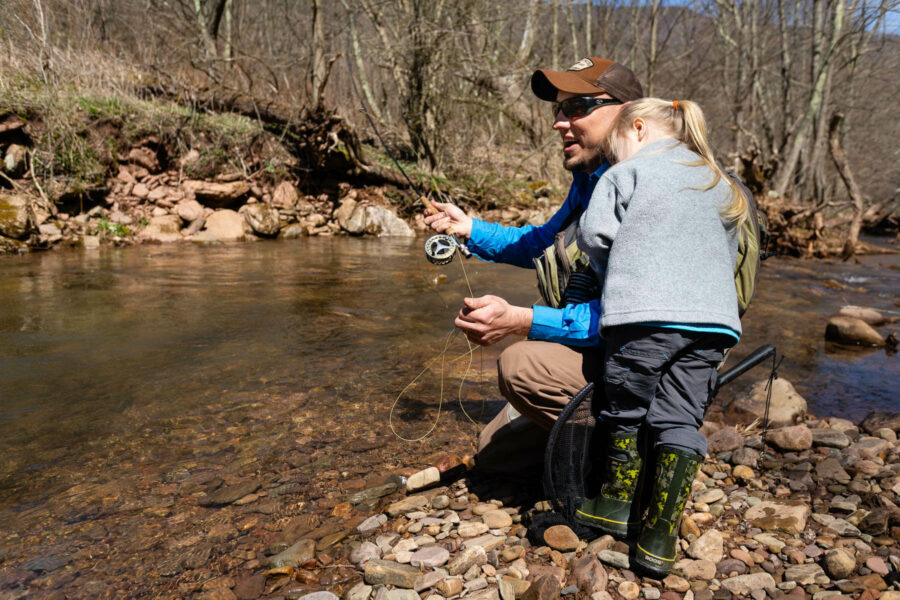Preserving the important things
Understanding our role in the ecosystem benefits us all

“If people concentrated on the really important things in life, there’d be a shortage of fishing poles.”
—Doug Larson
In three and a half years of fishing freshwater streams, you can learn a great deal. You learn how to spot a likely fishing hole, what nature needs to keep it all going, when to release to get that perfect cast and even a few things about what is important in life. It’s an impressive set of knowledge, and even more so when you’re only three and a half years old.
Little Brooklyn Wichterman is at home in her waders in the streams of West Virginia thanks to her father, Dustin Wichterman, lifelong outdoorsman and manager of the Trout Unlimited (TU) Potomac Headwaters program. He works for TU not because he believes in their mission of conserving and restoring cold water fisheries and their watersheds—although he does—but because the TU mission aligns with his own mission as a father. The important things in life for Wichterman are enjoying the outdoors and bringing enjoyment and wonder to Brooklyn’s life, which is why he has been taking her out on the streams with him since she was two weeks old.
This duo is fishing for the brightly painted brook trout. Other species of trout are stocked for recreational fishers, but stocked trout behave differently than native trout, born in the steams they inhabit. This changes the fishing experience for anglers like Wichterman.
Brook trout are the only trout native to the Chesapeake Bay watershed; they live and reproduce only in cold, clean streams. To be able to naturally experience these native trout long into the future, many anglers focus on conserving and protecting the surrounding environment by restoring streams, reducing pollution, spreading awareness and ensuring streams stay surrounded and shaded by trees, which cool the water for the cold-loving trout.
Wichterman places a small trout in Brooklyn’s little hands, which she immediately pops into the stream with a, “there you go!” She clutches her stuffed trout, Char Riffles, but she likes to watch the real ones swim away. “I want another fish. Catch one! Please catch one!” she pleads to her dad, bouncing on her small feet as the ripples of the departing fish are only just disappearing. Seeing the classroom that the wilds of West Virginia provides for his daughter and the place of renewal they still are for him, motivates Wichterman in his work with TU.
This human renewal in fishing is clear in the words of outdoorsman Fennel Hudson, who says, “catching fish is low on my agenda when I go fishing. I’m much more interested in savoring the day and exploring the wildlife of the river.”
Not all of the waters in the Chesapeake region are as clean and healthy as those that benefit from Wichterman’s dedication, or have young people growing up with them who are so connected to the joys nature can offer. Understanding our connection to a larger ecosystem can change the way we all go about our daily lives and help to restore neglected waters. By making small, conscientious changes in the way we live our lives, people of all ages and in all places can have the same connection and renewal right in their own backyard.
Learn how you can help.

Comments
It is in Dustin’s blood his passion for the love of the outdoors is few and far between. As his aunt I admire what he does it brings me back to the days of a child watching my grandparents (his great grandparents) with the fly fishing poles in there hands in the Adirondack Mtns of Ny state wow I remember as a child what an art. Dustin has set examples for both of my sons Zach and Ryan. Zach
Is a natural at fly fishing and spends every last minute like his cousin on a creek, stream or river searching for that glory we are blessed. Thank you TU for standing for what you are.
Thank you!
Your comment has been received. Before it can be published, the comment will be reviewed by our team to ensure it adheres with our rules of engagement.
Back to recent stories